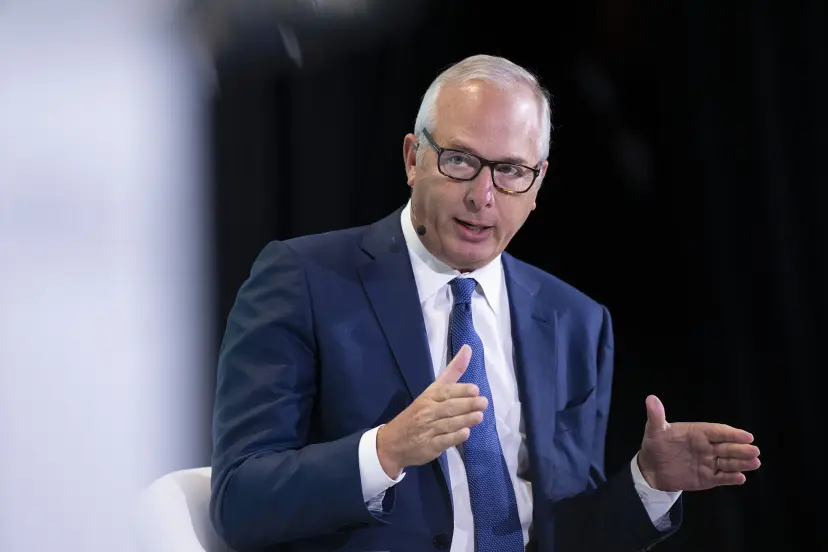Bobby Tudor made a fortune in fracking. The clean-cut financier opened shop in 2007 and spent the next 10 years backing large-scale projects in West Texas, supercharging one of history’s greatest oil and gas expansions. But over lunch in February, even as he predicted that oil and gas would be around for the foreseeable future, Tudor offered a dimmer view of the industry’s role in the region. “Oil and gas is just not going to be the same engine for growth,” he told me. “It will flatten, and then it will decline.”
Which is why Tudor, a consummate Texas fossil-fuel money man, is betting big on green energy.

It’s not hard to see why. The state is already the largest producer of renewable energy in the U.S. Clean-technology startups are flocking to the Houston region, and big energy companies are pursuing hydrogen projects across the state. The city of Houston alone could receive as much as $250 billion in annual investment in the emerging energy sectors by 2040, according to data from McKinsey, thanks in part to its existing infrastructure and skilled labor force. Tudor has started a new firm focused on cutting emissions, and is chairing a powerful business coalition dedicated to the transition and composed of some of the biggest names in energy, including Exxon-Mobil, Chevron, and Shell. “In Houston, when we see $1 laying on the ground,” he said, “we bend over and pick it up.”
There’s just one problem: politics. While many cities, states, and even countries are fighting for the trillions of dollars in public and private green investments that are transforming the energy industry, many Texas leaders, including a powerful segment of the state’s political leadership, are opposing the new opportunities. Some fear that clean energy will hurt the state’s incumbent fossil-fuel business. But many oppose the energy transition as a proxy for opposing Democrats, another way to prove to the conservative base that they are the reddest around. The result is a raft of measures that could hamper green-energy projects and incentivize carbon-heavy ones.
These divisions are setting up a surprising, high-stakes fight. Tudor’s coalition, the Houston Energy Transition Initiative (HETI), is organized by the city’s most prominent business group, and its members are putting serious cash behind new energy efforts. But some politicians are pushing back, launching efforts to slow renewable energy and publicly vilifying environment initiatives. “[Major oil and gas firms] may have supported us in the past, but they certainly don’t align with us now,” says Jason Isaac of the conservative Texas Public Policy Foundation. “They’re going to go and chase money—and it’s unfortunate.”
The fight in Texas can tell us a lot about the bigger push to address climate change. A well-executed transition would help cut global emissions, create wealth and opportunity for millions of Texans, and set an example for the world. But the unfolding debate also shows why it’s not so simple. Politics and culture are powerful forces everywhere, and despite mounds of evidence about the value of transition, it’s unclear whether long-term economic considerations will win out. We all have an interest in the outcome. “We need to do it for commercial reasons,” says Tudor, but “we have a responsibility to do it too. The challenges of climate change, and the energy transition broadly, are so enormous that they’re not going to be solved without us.”
On the news and in popular culture, Texas can seem like a MAGA fever dream as politicians race to pass antiabortion laws and grandstand about critical race theory. But the business community driving the state’s economy gives a different impression. Chatting at a sleek Italian restaurant in Houston’s eclectic Montrose neighborhood, Tudor sounds more patrician than partisan. We talk about oil prices, yes, but also about Houston’s diversity and civic life, and the divergence between energy-industry financial returns and the region’s economic development. It’s an old-school vision of companies as pillars of the community that Tudor and many of his fellow executives share, one where business and government are partners in the greater good.
It’s a reading rooted in history. Before the 20th century, Texas was a largely rural, agrarian state; the discovery of vast oil reserves in 1901 changed that almost overnight. Within a matter of years, the oil industry expanded rapidly and so did the state’s urban centers. Whether by necessity or ideology, the government has largely stayed out of the way of the private companies that drove rapid growth and economic prosperity.
That has left Texas well positioned to capitalize on the energy transition. Building big infrastructure projects in Texas is easy thanks to a light regulatory environment. Much of the existing infrastructure—think pipelines—can be converted to carry carbon dioxide or hydrogen. The state has the highest concentration of chemical engineers in the country, jobs well suited not just for oil and gas but also for new energy technologies. And the local higher-education system, funded in large part by industry, has top programs to continue churning out energy workers.
But it’s hard for a transition to catch on when there’s so much money to be made in petroleum. At times over the course of the past 50 years, oil and gas has constituted 15% of the state’s economic output, according to data from the Federal Reserve Bank of Dallas, and the state’s broader economy in turn oriented toward fossil fuels as well. The industry’s prospects have whipsawed lately. The sector already had been under-performing the rest of the stock market in the years before COVID-19 hit. As energy demand tanked worldwide amid the lockdown, the price of oil briefly went negative, sending shock waves throughout the industry.

An oil refinery in Texas City, Texas on Sep. 7, 2022. Brandon Bell—Getty Images
This unprecedented upheaval coincided with the beginning of Tudor’s campaign to get the industry to embrace the transition. An energy price spike driven by the Russian invasion of Ukraine and COVID-19 reopenings has led to dramatic profits for the industry and softened the short-term financial urgency of embracing the transition.
Read the full article here